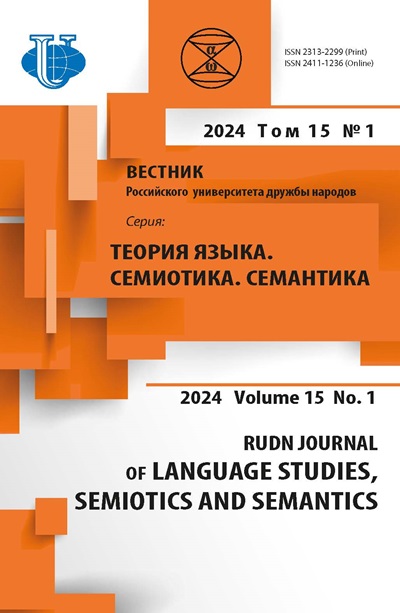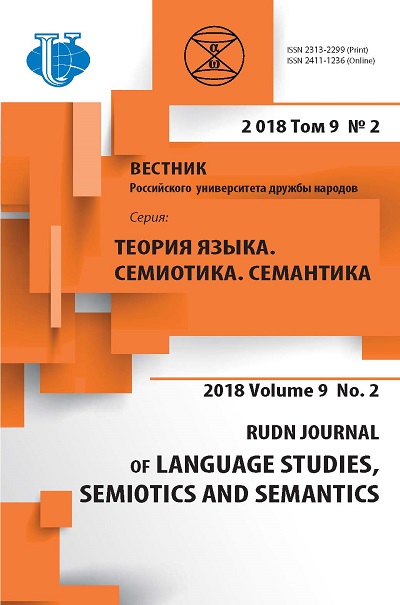THE AUTHOR'S COMPARATIVE LEXICOGRAPHY: PROBLEM STATEMENT. OPPORTUNITIES AND PROSPECTS
- Authors: Osokina E.A1
-
Affiliations:
- The V.V. Vinogradov Russian Language Institute of the Russian Academy of Sciences
- Issue: Vol 9, No 2 (2018)
- Pages: 416-438
- Section: LEXICOGRAPHY
- URL: https://journals.rudn.ru/semiotics-semantics/article/view/18753
- DOI: https://doi.org/10.22363/2313-2299-2018-9-2-416-438
Cite item
Full Text
Abstract
The paper first presents the unique material matching the description of the word TIME in different author's dictionaries, created one model - in is the idioglossarium of Dostoevsky and etnnoidioglossarium of Ch. Aitmatov. There are no textual database of all works of Chingiz Aitmatov, there is no etnnoidioglossarium, but perfectly designed structure of a dictionary entry in the idioglossarium of Dostoevsky gives the possibility, firstly, to create a similar entry on a separate piece of another author; secondly, it gives an opportunity to see the peculiarities of the author's intention and his creative workshop, even if the work of different writers belongs to the different epochs; thirdly, it gives an opportunity to see the broad linguocultural and historical context of the writer's Outlook. To compare the language of two writers in this article the most informative, interesting and suitable parameters for comparison on incomplete material are chosen: this word frequency is a significant indicator for idioglossa; this is a system of contextual values - definitions - giving an idea of the completeness of the meaning of the word; this is the phraseology that has a stable form; it is the aphorisms - are important indicators of the author's thinking; this is an associative field, identified vocabulary from the context of the idioglossa; there are figures of speech showing the level of language proficiency and the breadth of precedent texts. Not represented vocabulary of idioglosses, as it does not make sense to compare the wordlist of a single work and the most complete Glossarium of all the works of the two authors. For comparison, two authors were chosen - Russian-speaking and bilingual, writing in Russian and Kyrgyz languages, and this is a unique opportunity to see the creative and linguistic features of each on the basis of Russian. This comparison contains unlimited perspectives. The dictionary description of the writer's language reveals the worldview (“picture of the world”) of each of them does not depend on the subjective assessment of the researcher, but reveals the truth.
About the authors
Elena A Osokina
The V.V. Vinogradov Russian Language Institute of the Russian Academy of Sciences
Author for correspondence.
Email: ruslang@ruslang.ru
Candidate of Philology, Senior Researcher at the V.V. Vinogradov Russian Language Institute of the Russian Academy of Sciences; Scientific Interests: lexicography
18/2, Volkhonka, Moscow, Russia, 119019References
- Bogatova, G.A. (Ed.) (2000). Russian lexicographers of the XVIII—XX centuries. Moscow: Nauka. (in Russ).
- Russian author lexicography of the XIX—XX centuries (2003). Moscow: Azbukovnik, 42. (in Russ).
- Shestakova, L.L. (2011). Russian author lexicography: theory, history, modernity. Moscow: Languages of Slavic Culture. (in Russ).
- Dictionary of Dostoevsky's language. Idioglossary. (2008—2012). Russian Academy of Sciences. Institute of the Rus. yaz. them. V.V. Vinogradova; Yu.N. Karaulov (Ed.). Moscow: AZBUKOVNIK. (in Russ).
- Kasymaliev, B.Zh. & Kasymalieva, K.E. (2016). Lexicographic representation of the author's picture of the world In Languages. Peoples. Cultures. Materials of the scientific-practical conference. Moscow, October 27—28, 2016. Moscow: RUDN Universty, 57—67. (in Russ).
- Kasymalieva, K.E. (2016). Associative text field of ethnocultural idioglass “horse-pioneer” in the story “Farewell, Gulsary!” By Ch. Aitmatov. RUDN Journal of Language Studies, Semiotics and Semantics, 7(3), 36—43. (in Russ).
- Kasymalieva, K.E. (2017). Ethno-cultural idioglossa of the MOUNTAIN in the author's language picture of the world of Chingiz Aitmatov, Questions of psycholinguistics, 2(32), 150—158. (in Russ).
- Chulkina, N.L. & Kasymalieva, K.E. (2016). Textual associative field of the ethnocultural idioglass “Game” (based on the story by Ch. Aitmatov “Farewell, Gulsary!” In Scientific notes of the National Society of Applied Linguistics, 3(15), 55—67. (in Russ).
- Chulkina, N.L. & Kasymalieva, K.E. (2015). Idioglossary as a type of writer's dictionary. RUDN Journal of Language Studies, Semiotics and Semantics, 6(3), 141—145. (in Russ).
- Baranov, A.N. (2014). Fundamentals of phraseology. Moscow: Flinta: Nauka, 4. (in Russ).
- Shaikevich, A.Ya., Andryushchenko, V.M. & Rebetskaya, N.A. (2003). Statistical dictionary of Dostoevsky's language. Moscow, 515. (in Russ).
- Chingiz Aitmatov. And more than a century lasts a day.. URL.: www.litmir.me/br/?b=50366&p=1 (accessed: 07.03.2018). (in Russ).
- Dictionary of literary terms. (1974). L.I. Timofeev & S.V. Turaev (Ed.). Moscow: Рrosveshhenie. (in Russ).
- Dictionary of literary terms In Dictionaries and encyclopedias on Academica. URL.: http://literary_terms.academic.ru (accessed: 15.02.2018). (in Russ).
- Wikipedia. Figure of speech In Dictionaries and encyclopedias on Academica. URL.: https://dic.academic.ru/dic.nsf/ruwiki/1164892 (accessed: 23.03.2018). (in Russ).
- Osokina, E.A. (2012). Figures of speech in the commentary of the dictionary article of the idioglossary of Dostoevsky. In Materials of the All-Russian scientific conference “Word. Dictionary. Literature language yesterday and today (on the occasion of the 300th anniversary of MV Lomonosov)”. St. Petersburg, RSPU named by A.I. Herzen. November, 16—17, 2011. SPb.: SAGA, 95—101. (in Russ).
- Russian language. Encyclopedia (1997). Yu.N. Karaulov (Ed.). Moscow. (in Russ).
- Osokina, E.A. (2014). Parallelism: rhetoric or poetics, prose or verse, special reception or system? In “The Word of Dostoevsky 2014. The idiostyle and the picture of the world”. Collective monograph. Russian Academy of Sciences. Institute of Russian language. V.V. Vinogradova, E.A. Osokina (Ed.). Moscow: LEXRUS. (in Russ).













